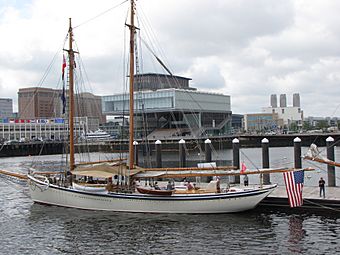American Eagle (schooner) facts for kids
|
American Eagle (Schooner)
|
|
 |
|
| Location | Rockland Harbor, Rockland, Maine |
|---|---|
| Built | 1930 |
| Architect | United Sail Loft Co. |
| NRHP reference No. | 91002064 |
Quick facts for kids Significant dates |
|
| Added to NRHP | December 4, 1991 |
| Designated NHL | December 4, 1992 |
The American Eagle, once known as Andrew and Rosalie, is a special two-masted schooner. A schooner is a type of sailing ship with at least two masts. Today, it takes tourists on fun trips from Rockland, Maine. This ship was built in 1930 in Gloucester, Massachusetts. It was the very last "auxiliary schooner" made there. This means it had both sails and an engine.
The American Eagle is also one of the last sailing fishing boats built in Gloucester. It is now a National Historic Landmark. This means it is a very important historical place or item. It is the oldest known ship of its kind that is still around today.
Contents
History of the American Eagle
Building and Early Fishing Days
The ship was first named Andrew and Rosalie. It was built in 1930 by the United Sail Loft Company in Gloucester. A local fishing captain named Patrick Murphy had it built. He named the ship after his children.
His family used the ship for fishing until 1941. Then, the Empire Fish Company bought it. They changed its name to American Eagle. The company changed the ship to work as a "trawler." A trawler is a fishing boat that pulls a large net through the water.
From Fishing to Fun Cruises
The American Eagle was mainly owned by the Piscitello brothers as a trawler. It worked as a fishing boat until 1983. In 1984, a man named John Foss bought the ship. He had just finished fixing up another historic schooner, the Lewis R. French.
Foss brought the American Eagle to the North End Shipyard in Rockland, Maine. He fixed it up to be a cruise ship. Now, during the summer, the ship sails around Penobscot Bay in Maine. It offers trips that last from three to seven days.
Special Cruises and Recognition
Usually, the American Eagle takes one longer trip each year. These trips can go to places like Grand Manan Island in Canada. It is one of the few schooners in Maine that goes on longer trips. It is also one of the few that sails offshore to look for whales. The ship often returns to Gloucester every year.
The American Eagle was added to the National Register of Historic Places in 1991. Then, in 1992, it was named a National Historic Landmark. It is special because it shows how fishing boats changed over time. It was built when sailing ships were becoming less common and modern trawlers were taking over.
A Small Incident
On August 3, 2016, the historic ship ran aground. This happened in Somes Sound, Mount Desert, Maine. It was during a "windjammer regatta," which is a race for large sailing ships. All 25 passengers were safely taken off the ship. The crew stayed on board. They waited for high tide to help the ship float again.
About the American Eagle
Ship's Design and Size
The American Eagle is a two-masted schooner with one main deck. It is about 76.4 feet (23.3 meters) long between its main front and back points. Its total length is about 90 feet (27.4 meters). The ship is 19.3 feet (5.9 meters) wide. The inside of its hold, where cargo or fish would be, is 10 feet (3.0 meters) deep.
Materials and Features
The ship's main frame and outer planks are made of strong oak wood. The inside ceiling is made of fir wood. The deck, where people walk, is made of pine.
Today, the ship has a schooner rigging, which means it has sails set up in a specific way. However, it did not have this rigging for much of its time as a fishing boat. The ship's hold has been changed to have fourteen cabins for passengers. Each cabin can hold two people.
 | DeHart Hubbard |
 | Wilma Rudolph |
 | Jesse Owens |
 | Jackie Joyner-Kersee |
 | Major Taylor |



